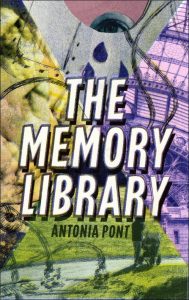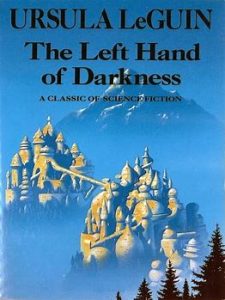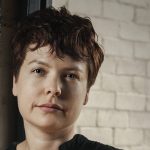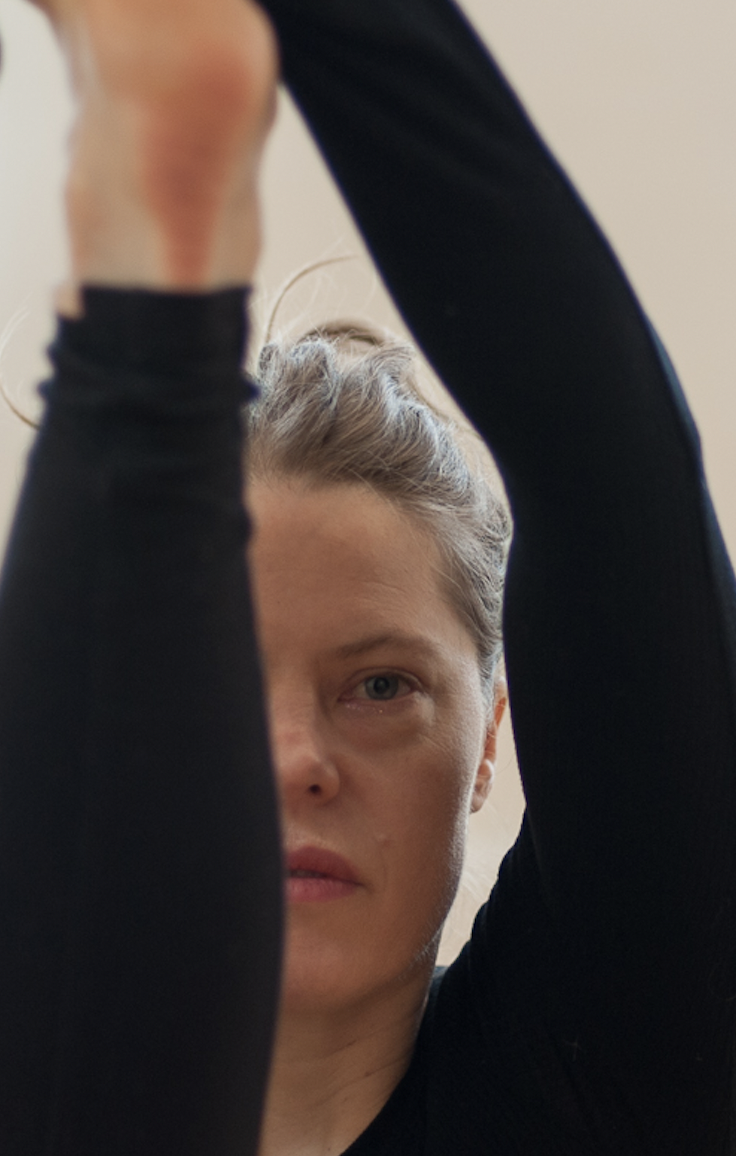In this interview with writer Tanya Vavilova, Antonia Pont talks about her creative practice, the inspiration for The Memory Library, about world-building, about the themes that this novella explores and about her next projects.
Tanya Vavilova interviews Antonia Pont.
- Could you please tell me a little about yourself and how you came to be a writer? Do you remember the first piece you had published?
I think I could say I am a weird mix of scholar, artist and yogi. I love super nerdy philosophical things, work a lot with creativity and play, alongside meditating, holding my breath or practising or teaching yoga poses. They all intersect as I experience them, and I couldn’t easily separate them out. Each mode sparks things within the others. I work at a university as a researching academic, teaching (which means learning a lot) and making research, whether that’s traditional or creative practice-based. The first piece I had published, I think… was a poem about going to a party, thrown by someone I thought might be hot. The party experience was so strange and fragmented that it birthed a poem. It was called ‘Truncated Acquaintance’ and did a lot of micro-detailing of elements of the setting as they swirled around the missed desire which anchored (or didn’t!) the evening. I had to fight for it a little, and that too was a good experience about staying with what you do. Risky, but necessary, if you aren’t only emulating what is being done already.
- How would you describe your latest book, The Memory Library? What was your inspiration for this work? Where did the idea begin?
 You know, I really can’t remember any moments of writing it. I was inspired by a winter I spent doing philosophy research in a small European city, and the characters grew out of that crystalline, quite moody, and monochromatic context. I know I worked on it a lot, over and over, and it’s strange that I can’t recall the duration of the writing activity itself. Although many writers report this… time disappears in the action of the play of the making. I loved the idea of a future that didn’t correspond to a chrome, leather and black glass kind of aesthetic, but to something more misshapen, a little broken or stunned at its situation in time, more tactile and personable.
You know, I really can’t remember any moments of writing it. I was inspired by a winter I spent doing philosophy research in a small European city, and the characters grew out of that crystalline, quite moody, and monochromatic context. I know I worked on it a lot, over and over, and it’s strange that I can’t recall the duration of the writing activity itself. Although many writers report this… time disappears in the action of the play of the making. I loved the idea of a future that didn’t correspond to a chrome, leather and black glass kind of aesthetic, but to something more misshapen, a little broken or stunned at its situation in time, more tactile and personable.
- The protagonists seek solace for their present troubles in the past. In this case, other people’s pasts. What is it that Hiru and Monin find in each other’s memories? Why are those memories so addictive?
I love that you ask this! I hadn’t thought of it that way. I think they seek closeness and distraction (from themselves), but have trouble sometimes with what closeness opens (risk, hurt, transition, delight…) each in their own way. The Memory Library lets them have a trial experience of others’ experiences and the flavour of atmospheres. It gives an appearance of encountering things other people have lived and recalled, without having to deal with the mess of human interaction (although they have to interact with Charlie!) They also come to the Library via different means. Monin is a seasoned user, whereas Hiru is newer; Hiru stumbles into the experience, and is at sea in their own life, and somehow open to the weirdness of this establishment and its practices.
- Charlie, the mysterious shopkeeper, can be affable and perceptive, or distracted and evasive, depending on the day. How do you see Charlie? Is he on a grand mission to foster human connection? Or is he a charlatan as Monin accuses him?
Charlie moves by laws that we don’t understand. I think we can say, above all, that he is a professional, and that by not getting too friendly with his clients, he is able to serve them better, and let the library cultivate something unexpected for them. My sense is that he responds as they change, like a kind of tango, but also remains unaffected by them. It’s slightly counter-intuitive. He keeps sufficient distance that he doesn’t need them to behave well. They are able to slosh around in becoming something new. And, as we know, this is rarely an elegant process. By being distant but also affable, Charlie offers something better than ‘authenticity’, or a too-smarmy friendliness, he stays steady, and allows them to surprise themselves, without appearing to notice the process he is assisting.
- This salt-encrusted, crumbling city is both familiar – people shop and go to work and ice-skating on the ice rink – and unfamiliar – you describe a lightbulb shortage, saline storms, analogue systems. How did you go about building this world?
The world built itself from the location-inspiration, the characters and a gradual accreting of small details. In the many, many rewrites, things were removed, or adjusted, since I was aiming for a light touch with the world. The reader hopefully knows we are there, and that they are not in their world, now. However, the world — as you say — is also familiar in the sense that people live on, even after an apocalypse of some kind. Creatures have a remarkable way of continuing with the daily and with relating. We still make meals if we can; we clean or arrange our space and timetables; we are busy with our hearts and obsessions, we adapt extremely fast and then improvise from there. Hiru is an observer, and they recall the changes and give the reader hints about what might have shifted, but they don’t fill in all the gaps, since inside ourselves (the story is in alternating first person), we often just get on with it.
- The story is set in the aftermath of an unnamed disaster or event. What was your thinking behind choosing not to name or describe the ‘before’ time?
I think, as I say above, it has to do with the style of each character. In the story, we only have the points of view and focalization of Hiru and Monin. They are both preoccupied and wounded in different ways, but neither of their emphases is on the historical past, as such. They are busy with their personal pasts and trying to move forward despite or by way of these. I wonder, on reflection, whether most of us grieve the collective experience via our own smaller windows on it. We never know the whole of history; we’re aware of events and may participate or not in important moments, but we live the nearness of our unique perspective. Hopefully we do this with an openness to what’s happening for others. Monin and Hiru taste something of that via the Library.
- On a practical level, what did the writing of this book look like? Did you always have two protagonists with alternate chapters, for example? Did you have the ending in mind at the beginning? Did you follow a particular process or routine to get the words down?
 As I mentioned, I have vague memories of the writing itself (I seriously can’t recall at what desk, in what café, on what train rides I might have worked on it.) You can see, memory is a slippery thing! I do know it was reworked a lot, but I think the work only got going, found its voice, so to speak, when I settled on this device of the two characters, narrating from their first-person points of view. There was something about the sensitivity and intelligence of both characters that really allowed me to write quite freely and fast (which doesn’t mean I didn’t edit oodles…) but there was a level of ease with how they might speak, and the way they perceived their worlds and predicaments. I also wanted them to be gender-fluid, and to avoid some difficulties in how language boxes us into existing binaries, the first-person point of view served to evaporate that problem. I always recall my experience of reading The Left Hand of Darkness by the great Ursula Le Guin. She gives the reader a chance to experience how they struggle not to impose gender binaries. Her character, Estraven, who does not have a fixed gender, gives the reader a chance to work to abstain from gendering them. Le Guin had the problem of needing a pronoun for Estraven at a moment when ‘they’ was not the convention for such things. She talks about choosing ‘he’ and received criticism for it. I still think what she was attempting did make the reader see something crucial about how much our thinking proceeds in twos. And it does. To practice suspending oneself in new ways, among these kinds of thinking-categories, is super interesting I think. Readers of The Memory Library may well assign a binary gender quickly to the characters. If we don’t harass ourselves, if we stop freaking out that we might get it wrong, and simply observe, we can learn a lot about how language, brains, assumptions, associations inform us (or don’t!) about gender. Maybe then, something looser and more playful becomes possible. Something kinder to the odd and unique ways we all are.
As I mentioned, I have vague memories of the writing itself (I seriously can’t recall at what desk, in what café, on what train rides I might have worked on it.) You can see, memory is a slippery thing! I do know it was reworked a lot, but I think the work only got going, found its voice, so to speak, when I settled on this device of the two characters, narrating from their first-person points of view. There was something about the sensitivity and intelligence of both characters that really allowed me to write quite freely and fast (which doesn’t mean I didn’t edit oodles…) but there was a level of ease with how they might speak, and the way they perceived their worlds and predicaments. I also wanted them to be gender-fluid, and to avoid some difficulties in how language boxes us into existing binaries, the first-person point of view served to evaporate that problem. I always recall my experience of reading The Left Hand of Darkness by the great Ursula Le Guin. She gives the reader a chance to experience how they struggle not to impose gender binaries. Her character, Estraven, who does not have a fixed gender, gives the reader a chance to work to abstain from gendering them. Le Guin had the problem of needing a pronoun for Estraven at a moment when ‘they’ was not the convention for such things. She talks about choosing ‘he’ and received criticism for it. I still think what she was attempting did make the reader see something crucial about how much our thinking proceeds in twos. And it does. To practice suspending oneself in new ways, among these kinds of thinking-categories, is super interesting I think. Readers of The Memory Library may well assign a binary gender quickly to the characters. If we don’t harass ourselves, if we stop freaking out that we might get it wrong, and simply observe, we can learn a lot about how language, brains, assumptions, associations inform us (or don’t!) about gender. Maybe then, something looser and more playful becomes possible. Something kinder to the odd and unique ways we all are.
Regarding the ending, I think the characters made it happen. I did not scheme to get the story there in the end. Many other things could have eventuated, but each of the main figures — Monin, Charlie and Hiru — worked and showed up for the happenings and their own processing of those. They brought something sincere and courageous to the process. I think this enabled what happens at the end to be possible. It’s the same for all of us, right?
- What are you working on at the moment? What’s next?
I’m always working on poems, since they are like a thinking mode for me. But I don’t have a collection in mind for now (or not anything solid). I’m writing the manuscript for a nonfiction book that’s coming out in 2025 with NewSouth Publishing. It’s called Plain Life. I know you have experience with essay collections, with your work We are Speaking in Code, so I might get in touch for tips! Plain Life builds on ideas I’ve explored in a series of long essays that readers can find on Literary Hub, in The Lifted Brow, in Antithesis and other spots, as well as radio interviews, podcasts and public talks. It is a longform reflection on how we could live a plain life, if this would be a life that allows itself to escape the binary of irrelevant/exceptional. The latter I see imposed on us by media culture in cahoots with neoliberalism, our own vanities and fragilities, our own predilection to bad thinking. The book will circle around mental health themes (I’m no psychologist) in a philosophical way, and hopefully hits that funny, provocative, even really irritating note that I aim for in essays where I want to talk about how we are all suffering together, sometimes in ways that don’t seem necessary, but are nevertheless hard to shift. I hope it’s a joyous book, precise and with the potential to spark courage and build obstinacy. One has to stay firm against certain things that care not a jot for our hearts, for our thinking and ability to live alongside each other in expansive ways.
 ANTONIA PONT is an essayist, theorist, poet and yogi, living in Naarm (Melbourne). Her research considers time, transformation, stability and desire, and recent works include: You Will Not Know In Advance What You’ll Feel (Rabbit Poets Series, 2019) and ‘On Leadership’ (The Lifted Brow, 2020).
ANTONIA PONT is an essayist, theorist, poet and yogi, living in Naarm (Melbourne). Her research considers time, transformation, stability and desire, and recent works include: You Will Not Know In Advance What You’ll Feel (Rabbit Poets Series, 2019) and ‘On Leadership’ (The Lifted Brow, 2020).
 TANYA VAVILOVA is the joint winner of the Small Press Network Book of the Year Prize 2021 for her debut collection of essays We Are Speaking in Code. Her short story collection Grub was awarded the Carmel Bird Digital Literary Award in 2019 and released in 2021 in print by Spineless Wonders.
TANYA VAVILOVA is the joint winner of the Small Press Network Book of the Year Prize 2021 for her debut collection of essays We Are Speaking in Code. Her short story collection Grub was awarded the Carmel Bird Digital Literary Award in 2019 and released in 2021 in print by Spineless Wonders.

